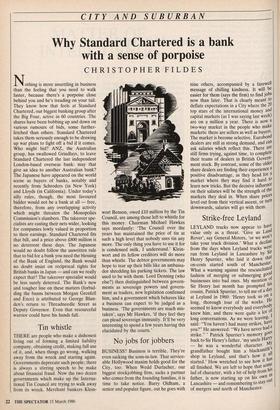Tin whistle
THERE are people who make a dishonest living out of forming a limited liability company, obtaining credit, making full use of it, and, when things go wrong, walking away from the wreck and starting again. Governments deprecate such people; there is always a stirring speech to be make about financial fraud. Now the two dozen governments which make up the Interna- tional Tin Council are trying to walk away from its wreck. Merchant bankers Klein- wort Benson, owed £10 million by the Tin Council, are among those left to whistle for this money. Chairman Michael Hawkes says mordantly: 'The Council over the years has maintained the price of tin at such a high level that nobody uses tin any more. The only thing you have to use it for is condensed milk, I understand.' Klein- wort and its fellow creditors will do more than whistle. The debtor governments may hope to tear up their bills like an ambassa- dor shredding his parking tickets. The law used to be with them. Lord Denning (who else?) then distinguished between govern- ments as sovereign powers and govern- ment as traders, new legislation confirmed him, and a government which behaves like a business can expect to be judged as a business. 'The governments are much mis- taken', says Mr Hawkes, 'if they feel they can plead sovereign immunity. It'll be very interesting to spend a few years having this elucidated by the courts.'


















































 Previous page
Previous page